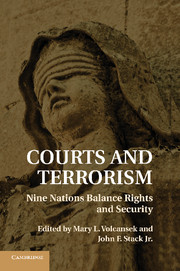Book contents
- Frontmatter
- Contents
- Contributors
- COURTS AND TERRORISM
- Introduction
- 1 Detentions and Security versus Liberty in Times of National Emergency
- 2 One More Casualty of the “War on Terror”
- 3 State Secrets and Democratic Values
- 4 What Lessons Can Be Drawn from a Sui Generis Case? The Global “War on Terror” and Northern Ireland
- 5 The British Experience with Terrorism: From the IRA to Al Qaeda
- 6 Detention and Treatment of Suspected Terrorists under the European Convention on Human Rights
- 7 Australia's Commonwealth Model and Terrorism
- 8 Judicial Rejection as Substantial Relief: The Israeli Supreme Court and the “War on Terror”
- 9 Preserving Rights and Protecting the Public: The Italian Experience
- 10 Squaring the Circle? Fighting Terror while Consolidating Democracy in Spain
- 11 From Exception to Normalcy: Law, the Judiciary, Civil Rights, and Terrorism in Colombia, 1984–2004
- Conclusion: Lessons Learned
- Cases Cited
- Statutes Cited
- References
- Index
6 - Detention and Treatment of Suspected Terrorists under the European Convention on Human Rights
Published online by Cambridge University Press: 05 July 2011
- Frontmatter
- Contents
- Contributors
- COURTS AND TERRORISM
- Introduction
- 1 Detentions and Security versus Liberty in Times of National Emergency
- 2 One More Casualty of the “War on Terror”
- 3 State Secrets and Democratic Values
- 4 What Lessons Can Be Drawn from a Sui Generis Case? The Global “War on Terror” and Northern Ireland
- 5 The British Experience with Terrorism: From the IRA to Al Qaeda
- 6 Detention and Treatment of Suspected Terrorists under the European Convention on Human Rights
- 7 Australia's Commonwealth Model and Terrorism
- 8 Judicial Rejection as Substantial Relief: The Israeli Supreme Court and the “War on Terror”
- 9 Preserving Rights and Protecting the Public: The Italian Experience
- 10 Squaring the Circle? Fighting Terror while Consolidating Democracy in Spain
- 11 From Exception to Normalcy: Law, the Judiciary, Civil Rights, and Terrorism in Colombia, 1984–2004
- Conclusion: Lessons Learned
- Cases Cited
- Statutes Cited
- References
- Index
Summary
Judgments are easily made under the assumption that the problems we confront are quite unlike those that have gone before. That has been especially problematic in the post–9/11 world in which secret prisons, detentions without trial, aggressive forms of interrogation, secret evidence, and special tribunals have been seen by the U.S. government and others as necessary and expedient tools for combating terrorism. Critics have seen these developments as ominous and possibly unique intrusions on civil liberties. In fact few, if any, of these issues or measures are new, and some of the techniques for combating terrorism have been tried and previously tested in courts, most notably in the European Court of Human Rights. This chapter will help readers recall some of the European experiences and outcomes that might inform our judgments these days. However, the practices in Europe have sometimes been as invasive of fundamental rights as those in the United States, so the outcomes are not always encouraging to human rights advocates.
Among the key differences between the European Convention for the Protection of Human Rights and Fundamental Freedoms (ECHR) and the U.S. Constitution is that Article 15 of the ECHR provides for derogation from the rights and procedural obligations undertaken by member states under the convention. Derogation is allowed “in time of war or other public emergency threatening the life of the nation,” although certain rights are exempted from derogation.
- Type
- Chapter
- Information
- Courts and TerrorismNine Nations Balance Rights and Security, pp. 112 - 133Publisher: Cambridge University PressPrint publication year: 2010



